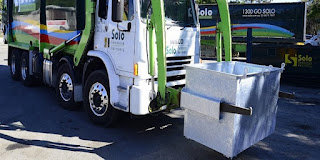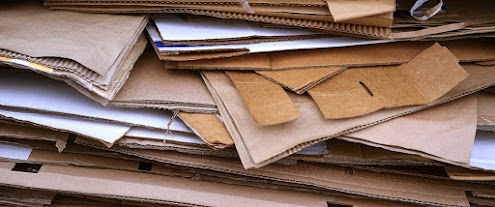For Domestic and Commercial Waste Recycling, Contact the Nearest Waste Management and Recycling Facility– But Why?
Waste management has evolved into a crucial problem. Our world has accumulated a massive amount of waste as a result of the exponential rise in global population over the last few centuries, especially since there is still a scarcity of proper disposal solutions. Every year, Australia generates 12.6 million tonnes of MSW, 27 million tonnes of C&D, and 21.9 million tonnes of C&I.
Why
should you recycle your biowaste?
The key advantages of recycling biowaste include:
·
Saves energy – Recycling
biowaste in facilities generates biogas which then enables the production of
energy.
·
Saves resources – Biowaste is
converted into compost in facilities. The compost is then utilized as an
organic fertilizer for gardening and agriculture while avoiding the application
of other fertilizers. Compost happens to improve soil quality, including its
porosity, fertility, nutrient retention, and water retention.
·
Other fractions such as glass,
paper, metals, and plastics never contain organic matter, which basically helps
better the non-organic recycling, in quality, quantity, and inefficiency as
well.
· Recycling biowaste also helps
the air and water bodies remain uncontaminated – To treat biowaste in
facilities helps avoid odor problems, also leachates in landfills and gas
emissions. Biowaste is amongst the precursors of dioxins production, and furans
in incinerators.
·
Soil quality upgrades – The
compost aid in improving the fertility and structure of degraded soils and
deficiencies in organic matter that are quite common throughout Australia.
·
Reduces the greenhouse gas
emissions – As we all know, how fast landfill emissions are contributing to
global warming, one of the biggest advantages of treating biowaste in
facilities is that it helps bring down the emission of gases, for example,
Methane and Carbon dioxide, significantly responsible for global warming.
·
Lessens waste that is sent to
the landfill
What does the AWRC do with your household rubbish?
The
Adelaide Waste and Recycling Centre is an advanced resource recovery and waste
recycling facility in Adelaide.
Solo Resource
Recovery manages their waste transfer station as well as their commercial
services. The AWRC accepts all types of domestic and commercial waste,
including but not limited to:
·
General waste
·
Paper and cardboard waste
·
Construction & demolition
waste
·
Green waste
·
Residual waste items including
gas bottles
·
Paint
·
Motor oil, vegetable oil
·
Tyres
·
Clean soil
·
Mattresses
·
Hazardous waste
Upon the arrival of the rubbish
The
clerk at the gate control box will direct you to the designated waste disposal
area. The onsite bulk skip bins are strategically placed throughout the
facility for both public and commercial use. As part of their ongoing
commitment to providing sustainable waste management services to Adelaide and the surrounding community, the Adelaide
Waste and Recycling Center has been designed to maximize garbage segregation.
How can you secure your trash load before bringing it to the facility?
When
transporting waste, you must be extra cautious to avoid problems on the road
and to ensure a comfortable journey throughout.
·
As suggested by the AWRC and
team:
·
Use a load rated tie-down
strap, available from most hardware shops.
·
Use a cover to prevent
material from spilling onto the roadway.
·
Avoid overloading your
vehicle.
·
Separate the items by waste
type, to allow for a smooth unload.
·
When in any doubt, throw that
extra strap or rope over.
Adelaide Commercial Waste services
The
AWRC can help you with both commercial and household waste disposal. However,
it is always advisable to consult with a professional before putting the trash
truck on the road. The facility will give free waste evaluation services. If
you are a fully operational factory or a family with a larger number of
members, you can schedule a regular collection or one-time collection and
disposal for liquid waste, recycling bins, industrial bins, and more.
With
growing challenges in China and Indonesia prohibiting waste recycling, it is up
to the rest of us to maintain our recycling practices so that we are prepared
for any upgrades that the waste industry may face in the near future.
Contamination is one of the raging fears instilled in those charged with
managing thousands of tonnes of garbage in order to keep a city safe and
secure. Contaminating the recycling bin with general garbage may render the
entire bin 'unsuitable' for the recycling process; as a result, the
contaminated bin will end up in the landfill, contributing to toxic gas
emissions.
Nonetheless,
public awareness and ongoing education could greatly improve the contamination
problem. For many years, the Adelaide Waste and Recycling Centre has collected,
managed, and recycled commercial and household waste from all over Adelaide.
With their resource recovery and recycling technologies, they have grown to
stand out today.
In a nutshell
Let us
all pledge to recycle our recyclable waste by using our local recycling
facilities, such as the Adelaide Waste and Recycling Centre. If your
municipality does not offer collection services, contact the nearest resource
recovery and waste recycling centre. Make an effort to separate your plastic,
metal, glass, and paper waste at home. Find ways to reuse non-recyclable waste
items (if at all possible).





.jpg)

Comments
Post a Comment